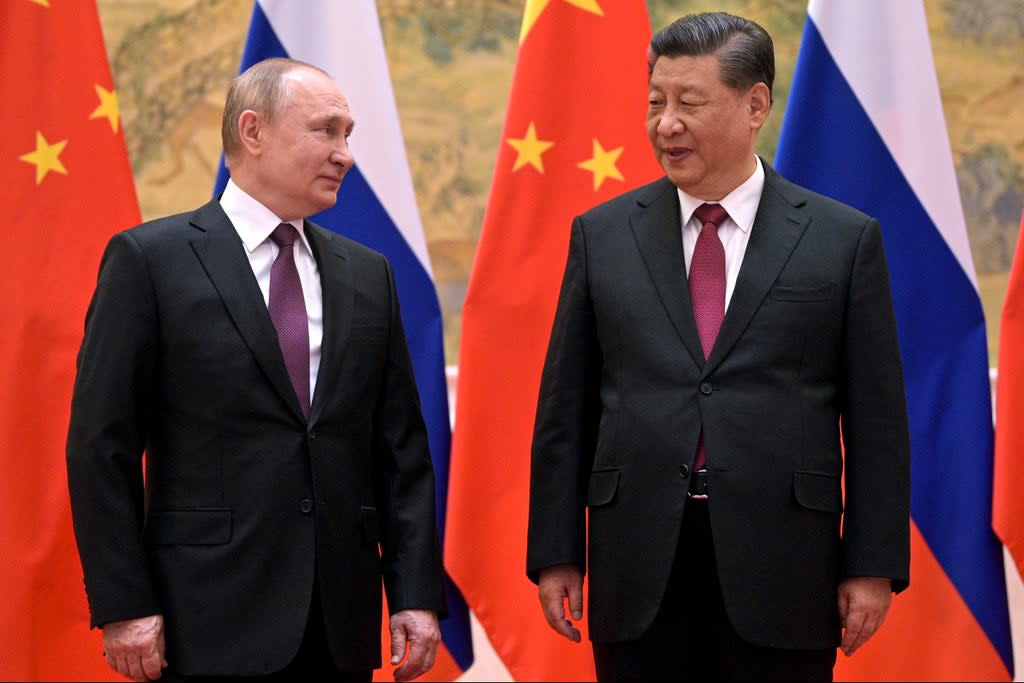OPINION - Xi Jinping gambled on a new era with Vladimir Putin. Is Beijing about to pay?

Vladimir Putin set out to restore a cross between the Soviet Union and the Russian Empire. In fact, his botched invasion of Ukraine has revived the West, sprung the EU and Britain into action and unsettled Xi Jinping in China. The only thing that now looks “brain dead”, which is how French president Emmanuel Macron infamously described Nato three years ago, is the Kremlin plan to seize Kyiv in days.
Geopolitics and war are always also about aura. In the run-up to Putin declaring a “special military operation” at 5.45am Moscow time two weeks ago, an aura of invincibility had gathered not only about Putin personally, dreaded as a master tactician, but about Russian military and intelligence assets, from the GRU to its elite hackers, after 15 years of military victory. This aura, in the mud around Kharkiv, the fiasco in Russian logistics and the ridiculousness of Moscow’s assumptions about Ukraine, has now been destroyed.
This was not how it looked when Putin travelled to Beijing and the Winter Olympics just over a month ago to sign a 5,000-word joint statement announcing “international relations were entering a new era”. The Kremlin’s successes, in Georgia, Crimea, Donbas, Syria and as far afield as Burkina Faso and Mali with its Wagner Group mercenaries, had not only intimidated a great many Western leaders but convinced China of Russia’s indispensable power.
Western intelligence believes, even as Russian officers in the field had little clue as to what they were doing on the Ukrainian border, that the Chinese leader Xi Jinping was briefed on Putin’s invasion plans and asked the Kremlin to wait until after the Winter Olympics, believing Russia could swiftly topple the government of Volodymyr Zelensky, a Jewish comedian who once played the piano with his genitals.
Aura was crucial to decisions leaders took in those weeks leading up to war. America and Britain’s armed forces, as well as the CIA and MI6, have acquired an aura of idiocy and incompetence over the past 20 years: beginning with the false pretences that took us into Iraq and culminating in the collapse of the $72 billion-funded Afghan National Army and the humiliating Taliban takeover of Afghanistan in under 10 days.
This aura was so powerful that France and Germany did not truly believe US and British intelligence about the imminent invasion of Ukraine until it had happened — Germany’s chief spy was actually caught on the ground in Kyiv — and Washington and London themselves did not believe Ukraine had trained a competent army ready to fight, despite all their investment.
Instead that army, reinforced in the run-up to war in a European charge led by Britain, has dashed the illusion of Russian invincibility. Now the Chinese leadership, according to CIA director William Burns, is “unsettled” by the difficulties the Russians have run into. Militarily, it is clear that if a Western-trained and equipped army wants to fight, it is no Afghan National Army. In fact, attempting to conquer Taiwan would already be a much taller order than Putin’s invasion of Ukraine — over choppy seas it would be closer in difficulty to “Operation Sealion”, the codename for Hitler’s plan to invade Britain. And that would be before Washington had committed its forces to any fight.
Diplomatically, what Zelensky calls the “anti-war coalition” looks menacing to Beijing. Not only has the severity of the sanctions caught them by surprise, this grouping is seen across the Indo-Pacific theatre as a potential dry run for the sanctions coalition on China if it invades Taiwan. This is why countries like Australia, South Korea, Singapore and Japan are signing up.
Meanwhile, the CIA believes, the leadership in Beijing is concerned reputationally. China does not want any “reunification” to be seen across the world as imperialism, after Putin’s invasion was denounced by the Kenyan ambassador to the United Nations.
This brings us to the contradiction at the heart of America’s grand strategy. It has created a situation where, financially and technologically, Russia will struggle to keep going without China’s support. But at the same time America’s global posture, pushing back on Chinese aggression, incentivizes that support to keep coming. Xi Jinping likely thought he was entering a glorious “new era” together with a successful Putin. He may now fear he has to stick with a weakened one to face a revived West.
Ben Judah is an author and senior fellow at the Atlantic Council

 Yahoo News
Yahoo News 
